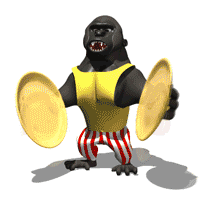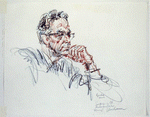Posted on January 19,
2015
Personhood-winked
“Animal rights” are anti-human
by
Daniel
Clark
When is a person not a human? Why, when it’s a “non-human person,” of
course. If that’s the unfunniest riddle you’ve ever heard, there’s good reason, because
its answer has potentially deadly consequences.
In Argentina, an appellate court has bestowed legal
personhood on an orangutan named Sandra.
Meanwhile, here in the States, proposed “personhood laws” that would recognize
every human being as a person are regarded as controversial. These two stories are undoubtedly related, as
the terminology of the anti-human animal rights movement makes clear.
 The
Argentine court declared Sandra to be a “non-human person,” that must be
released from a zoo in order to realize her fundamental right to liberty. That terminology is borrowed from utilitarian
“ethicists” like Peter Singer, the infamous advocate of infanticide and
bestiality who teaches philosophy at Princeton.
According to their realignment of the animal kingdom, the word “person”
and the noun “human” occupy separate categories.
The
Argentine court declared Sandra to be a “non-human person,” that must be
released from a zoo in order to realize her fundamental right to liberty. That terminology is borrowed from utilitarian
“ethicists” like Peter Singer, the infamous advocate of infanticide and
bestiality who teaches philosophy at Princeton.
According to their realignment of the animal kingdom, the word “person”
and the noun “human” occupy separate categories.
They define “persons” as those creatures that are
self-aware as individuals. Of course,
there’s no way of proving that, which makes personhood a largely subjective
determination. Does your dog come when
you call his name? Then he, too, might or
might not be a “non-human person.”
Generally speaking, those who subscribe to this belief
categorize seemingly intelligent animals as “non-human persons,” whereas those
human beings who are apparently not self-aware – the unborn, newborns, people
in comas, and the severely mentally handicapped – are “human non-persons.” As Singer wrote in his 1979 book, Practical Ethics, “Human babies are not
born self-aware, or capable to grasp that they exist over time. They are not persons, therefore the life of a
newborn is of less value than the life of a pig, a dog or a chimpanzee.”
The decoupling of personhood from humanity cannot promote
animals without also devaluing humans, which is the entire point. The judges who recognized a “non-human
person” set the legal groundwork for denying the rights of certain humans, and
they must know that. Not only may the
precedent be used to demote people to the legal status of “non-persons,” but it
could also deteriorate the rights of recognized “human persons,” by redefining those
rights as things that can belong to lower animals as well.
The ruling doesn’t turn Sandra loose on the streets,
mind you. It merely transports her from
the zoo to a sanctuary. Is that
liberty? She’s an adult “person,” after
all. At 28, she’s more than old enough
to drive and purchase liquor. Maybe
she’d rather be living the high life in downtown Buenos Aires, flitting around
the big city like a hairy Marlo Thomas. Yet champions of “non-human person” rights think
nothing of inhibiting her freedom to do so.
Sandra’s case demonstrates that “non-human persons”
can only be elevated so far. In order to
equate them with real people, the status of people must be lowered on the other
end of the pulley. Hence, liberty is no
longer anything more than captivity under more comfortable conditions. The ramifications for “human persons” ought
to be obvious. If being kept and provided
for is “liberty” enough for Sandra, then why not for you and me?
 It’s
true that no court in the United States has yet granted personhood to a
non-human, but it may be only a matter of time.
Remember that in Roe v. Wade,
the Supreme Court conceded that its decision must be reversed if it is ever
concluded that the human unborn are “persons.”
To defend the legality of abortion, liberal judges have since had to
play dumb about the most elementary facts of life. Their problem may now be solved, simply by
adopting a pseudo-scientific paradigm that empowers them to decide who is or is
not a “person.”
It’s
true that no court in the United States has yet granted personhood to a
non-human, but it may be only a matter of time.
Remember that in Roe v. Wade,
the Supreme Court conceded that its decision must be reversed if it is ever
concluded that the human unborn are “persons.”
To defend the legality of abortion, liberal judges have since had to
play dumb about the most elementary facts of life. Their problem may now be solved, simply by
adopting a pseudo-scientific paradigm that empowers them to decide who is or is
not a “person.”
Justice Stephen Breyer advocates the use of foreign precedent
in interpreting American law, and lots of other liberal judges agree with
him. Next time the question of legal
personhood comes before the U.S. Supreme Court, Sandra’s case could actually be
used to justify changing the Fifth and Fourteenth Amendments’ definition of “person,”
to the exclusion of whole classifications of actual human beings.
It’s no coincidence that the same Peter Singer who
wrote Animal Liberation also
co-authored Should the Baby Live?: The
Problem of Handicapped Infants. The
argument for legally treating animals like people is really just a
thinly-veiled excuse for treating people like animals.
The truth be known, Sandra couldn’t give a flying
fistful of vomit that she’s been legally declared a person. Tragically, that’s one thing she and most
humans have probably got in common.
The Shinbone: The
Frontier of the Free Press